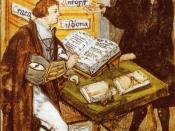The net income of Simon and Hobbs, a department store, decreased sharply during 2000. Carol Simon, owner of the store, anticipates the need for a bank loan in 2001. Late in 2000, Simon instructs the store's accountant to record a $10,000 sale of furniture to the Simon family, even though the goods will not be shipped from the manufacturer until January 2001. Simon also tells the accountant not to make the following December 31, 2000 adjusting entries:
Salaries owed to employees: $900
Prepaid insurance that has expired: $400
Why is Simon taking this action? Is her action ethical? Give your reason, identifying the parties helped and the parties harmed by Simon's action.
Ms. Simon is probably taking these actions so that her business will seem more attractive when she try's to get the loan. Their income "decreased sharply" in 2000, so to make up for that decrease in assets, she has asked her accountant to lie by adding the $10,000 early to make her assets increase.
By telling the accountant not to make the adjusted entries for salaries owed to employees and the expired prepaid insurance, she is making her liabilities decrease- thus; she is raising her income (assets) and decreasing expenses (liabilities) so she will have a better chance of getting the loan she wants to apply for.
I believe Carol Simon's actions are unethical because she is lying and it could harm both the bank and the accountant. The bank may give her business a loan assuming that the information given is correct, if business continues to decrease, she may not be able to pay back the loan- which will hurt Ms. Simon as well. The accountant would be putting her career in jeopardy if she does as Ms. Simon asks. (I don't think it's ethical to...


